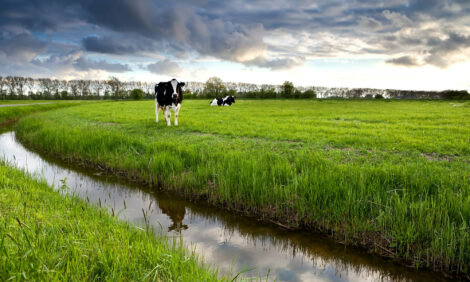



US farm groups want Trump to spare undocumented from deportation
Nearly half of US farm workers lack legal statusUS farm industry groups want President-elect Donald Trump to spare their sector from his promise of mass deportations, which could upend a food supply chain heavily dependent on immigrants in the United States illegally, reported Reuters.
So far Trump officials have not committed to any exemptions, according to interviews with farm and worker groups and Trump's incoming "border czar" Tom Homan.
Nearly half of the nation's approximately 2 million farm workers lack legal status, according to the departments of Labor and Agriculture, as well as many dairy and meatpacking workers.
Trump, a Republican, vowed to deport millions of immigrants in the US illegally as part of his campaign to win back the White House, a logistically challenging undertaking that critics say could split apart families and disrupt US businesses.
Homan has said immigration enforcement will focus on criminals and people with final deportation orders but that no immigrant in the US illegally will be exempt.
He told Fox News on Nov. 11 that enforcement against businesses would "have to happen" but has not said whether the agricultural sector would be targeted.
"We've got a lot on our plate," Homan said in a phone interview this month.
Mass removal of farm workers would shock the food supply chain and drive consumer grocery prices higher, said David Ortega, a professor of food economics and policy at Michigan State University.
"They're filling critical roles that many US-born workers are either unable or unwilling to perform," Ortega said.
Farm groups and Republican allies are encouraged by the incoming administration's stated focus on criminals.
Dave Puglia, president and CEO of Western Growers, which represents produce farmers, said the group supports that approach and is concerned about impacts to the farm sector if a deportation plan was targeted at farmworkers.
Trump transition spokesperson Karoline Leavitt did not directly address the farmer concerns in a statement to Reuters.
"The American people re-elected President Trump by a resounding margin giving him a mandate to implement the promises he made on the campaign trail, like deporting migrant criminals and restoring our economic greatness," Leavitt said. "He will deliver."
Trump announced on Saturday that he would nominate Brooke Rollins, who chaired the White House Domestic Policy Council during his first term, to become agriculture secretary.
Agriculture and related industries contributed $1.5 trillion to the US gross domestic product, or 5.6%, in 2023, according to the US Department of Agriculture.
In his first administration, Trump promised the farm sector that his deportation effort would not target food sector workers, though the administration did conduct raids at some agricultural worksites, including poultry processing plants in Mississippi and produce processing facilities in Nebraska.
US Representative John Duarte, a Republican and fourth-generation farmer in California's Central Valley, said farms in the area depend on immigrants in the US illegally and that small towns would collapse if those workers were deported.
Duarte's congressional seat is one of a handful of close races where a winner has yet to be declared.
Duarte said the Trump administration should pledge that immigrant workers in the country for five years or longer with no criminal record will not be targeted and look at avenues to permanent legal status.
"I would like to hear more clearly expressed that these families will not be targeted," he said.
'We need the certainty'
Farmers have a legal option for hiring labor with the H-2A visa program, which allows employers to bring in an unlimited number of seasonal workers if they can show there are not enough US workers willing, qualified and available to do the job.
The program has grown over time, with 378,000 H-2A positions certified by the Labor Department in 2023, three times more than in 2014, according to agency data.
But that figure is only about 20% of the nation's farm workers, according to the USDA. Many farmers say they cannot afford the visa's wage and housing requirements. Others have year-round labor needs that rule out the seasonal visas.
Farmers and workers would benefit from expanded legal pathways for agricultural laborers, said John Walt Boatright, director of government affairs at the American Farm Bureau Federation, a farmer lobby group.
"We need the certainty, reliability and affordability of a workforce program and programs that are going to allow us to continue to deliver food from the farm to the table,” said John Hollay, director of government relations at the International Fresh Produce Association, which represents produce farmers.
For decades, farm and worker groups have attempted to pass immigration reform that would enable more agricultural workers to stay in the US, but the legislation has failed so far.
The risk of enforcement against farms is likely low because of the necessity of the workers, said Leon Fresco, an immigration attorney at Holland & Knight.
"There are some very significant business interests that obviously want agricultural labor and need it," he said.
But for farmworkers, the fear of enforcement can create chronic stress, said Mary Jo Dudley, director of the Cornell Farmworker Program, which is training workers to know their rights if confronted by immigration officials.
If there are again raids on meatpacking plants, immigration enforcement should take precautions to avoid detaining workers in the country legally, said Marc Perrone, international president of the United Food and Commercial Workers union, which represents some meatpacking workers.
Edgar Franks, a former farmworker and political director at Familias Unidas por la Justicia, a worker union in Washington state, said the group is seeing new energy from workers to organize.
"The anxiety and fear is real. But if we're together, there’s a better chance for us to fight back," he said.



